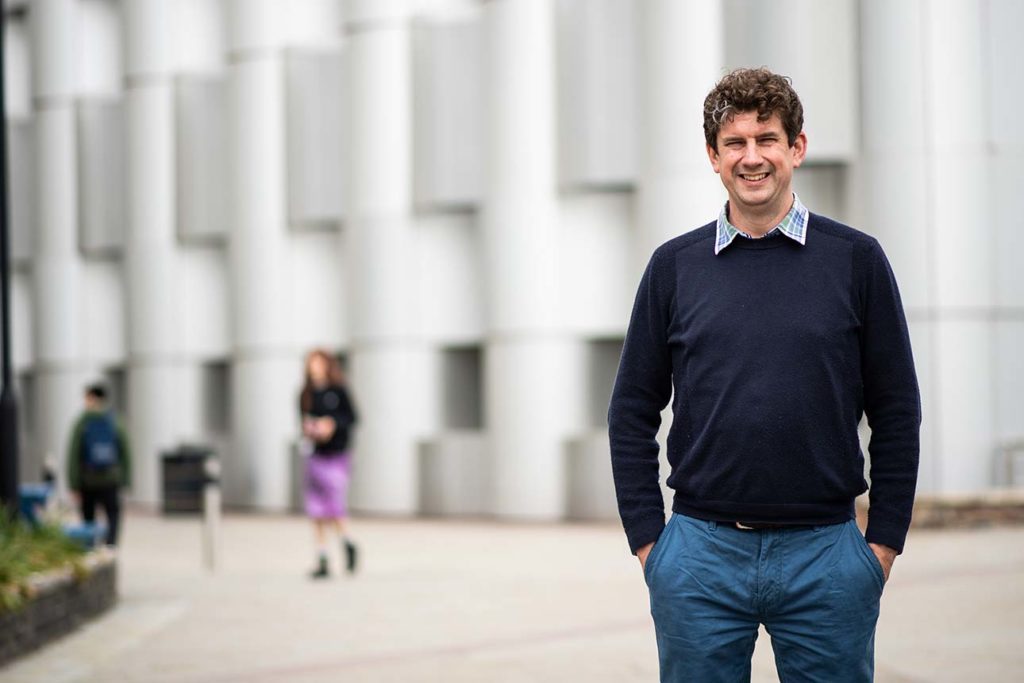"It’s time for fresh, engaged thinking that capitalises on the crisis around talent to drive innovation. Only then will we really start to lay the bedrock for an employment landscape that our brightest and best young talent will want to meaningfully connect with." - Rob Taffinder, assistant director of the University of Bristol's Careers Service

09 May 2022

Story by
Megan Lloyd Davies, Guest Author
The HR World has teamed up with the University of Bristol (UoB) to host Culture Clash, a panel debate on what SMEs and corporates need to know about attracting emerging talent. Here, Rob Taffinder, assistant director of UoB’s Careers Service makes the case for the young – what they need and, crucially, what they are not currently getting.
The talk in recruitment right now is all about the war on talent.
But there is one key area we’re curiously silent on – the fundamental generational disconnect in how we are looking to attract talent in the future.
It’s time to accept the old ways of doing things are no longer fit for purpose. We must radically rethink both our attitudes and approaches.
At universities nationwide this year, student engagement with employers has dropped. In a world of digital seminars, young people haven’t logged on in the way employers have come to expect in the drive to attract fresh blood.
Exhausted by a pandemic and busy with study they’ve often had to negotiate alone, young people have been hard to reach. Many are also putting off career decisions until after they’ve crossed the degree finish line.
Drop in economic prosperity
But this isn’t just another Covid quirk. Underpinning this trend are the far deeper currents governing how young people now live their lives – and it’s these that companies, however large or small, must better adapt to.
Too often, the talk in recruitment centres on the younger generation coming into business.
But let’s start instead with those at the top of it – Baby Boomer or Generation X leaders who came of age without social media, the luxury of realistic house prices and an acceptance of anything from paternalistic to exploitative corporate culture.
Put simply? We are now anachronisms when it comes to attracting future talent. And we must start to meaningfully empathise with the vastly different realities that young people are now coming of age with.
Practically, they have more career choices than ever before. It’s a huge opportunity for them. But it’s also overwhelming. Financially, they are aware that the Millennials who came before them are the first generation to experience a drop in economic prosperity.
A sharp lesson
Psychologically, they can no longer live in blissful ignorance of the progression, promotions and pay rises of their peers thanks to social media.
Add in the sharp lesson, at a relatively young age, about just how fragile what we’ve long taken for granted can be and it’s a perfect storm that employers must now skillfully navigate.
We can start by acknowledging a fundamental psychological shift in the emerging talent we are trying to recruit. Just as Maslow said, there is a Hierarchy of Needs that motivates them.
But, with rising food costs and energy prices, stagnant wages and ever-rising house prices, those entering the workforce today are facing a far more complex dance to meet even the most basic of needs.
All this certainly makes them willing to be more demanding of employers than ever before. But it is a misnomer to say that Generation Z is entitled.
Punishing landscape
They aspire to what older generations did – namely, security, lifestyle, home ownership and job satisfaction. But amid the punishing landscape they must now negotiate, they are understandably more bullish in their salary expectations and prepared to move jobs to achieve them.
They’ve also come of age in a culture that is far more questioning about what motivates companies – and their leaders.
Many young people have the sense that neither really cares about them. Gone are the days when those entering the workforce felt they had found an employer that would guide them parentally through life. They are consequently more individualistic about realising their aspirations.
But still the attitude persists that talent is a resource – not an asset. And this manifests itself in a thousand tiny details – the expectation that graduate employees will stay for years and a sense of grievance when they don’t, or a distinct lack of curiosity about what drives the very people we’re trying to attract.
Investing in tomorrow’s talent
It’s crucial that companies focus on the time and effort they are investing in tomorrow’s talent. Increasing links with young people in local communities is key.
Recruitment tomorrow is about laying the groundwork for long-term relationships today. To be an attractive employer to diverse talent, you need to demonstrate why young people would want to work for you and this starts with relationship building at a far earlier point in their lives.
Greater focus is also needed at the early stages of careers. Those moving into the workforce are experiencing a far more rapid rate of change now than ever before. Technology is ever-relentless, the pandemic has radically shifted the practical ways in which many work – from physical spaces to a variety of hybrid working models.
But still we expect new recruits to hit the ground running. They’re young, they can do it surely? Well no. They need more support.
Recruitment tomorrow is about laying the groundwork for long-term relationships today. To be an attractive employer to diverse talent, you need to demonstrate why young people would want to work for you and this starts with relationship building at a far earlier point in their lives.

Vital sense of community
But perhaps the most important thing we can do to prepare for the future is to look to the past – and the vital sense of community that work so often provided.
In so many ways, Covid has driven the pursuit of efficiency and profitability at the cost of this. Office space is being reduced in a drive for financial efficiency, the desires of older workers for more flexible, remote working often prioritised above the wishes of younger employees. But what is the price of leaving them to work remotely, without the mentorship and vital social connection that workplaces provide?
Advocating for a reconnection to the greater meaning behind work is not a benevolent gesture by people leaders. It’s a commercial necessity.
We spend more time in work than we do anywhere else, and employment is hugely impactful on people and communities. I fear that we’re sleep walking into a world of work that more and more young people will find hard to really care about.
Then there are the values that companies are too often encapsulating in slick marketing messages. Young people have a far more sophisticated and nuanced understanding of the line between talking the talk and walking the walk. It’s now a necessity to embody your purpose.
Tomorrow’s leaders want to work for an organisation they can feel proud of. I hear this again and again. Salary and benefits are important. Purpose will give you the cutting edge. Organisations that live their purpose and encourage employees to do so as well will not only attract the best, most diverse talent, but retain it in the future too.
But there are still too many headline statements without meaningful thinking behind them, too many leaders on a hamster wheel of doing the same thing rather than searching for new solutions.
Collective perspective
Employers, leaders and recruiters have become lazy, relying more on the process and efficiency when it comes to attracting young people and often relying on technology to carry out large elements of the selection process.
This high-volume approach has led to a faceless experience, leaving young people feeling undervalued and having no relationship with the roles or businesses they are applying to.
The trust that they have with the business world is worsening and unless we wake up to this fact and realise that action, not words, matter, we are going to lose the war when it comes to attracting and retaining the talent we need to remain competitive in the future.
It’s time for truly fresh, innovative and engaged thinking that capitalises on the crisis around talent as a way to drive proper innovation.
At its heart will be a key transformation in our collective perspective: recruitment is no longer a one-way process. It’s a two-way, ever-evolving relationship between employer and future employee.
Only then will we really start to lay the bedrock for an employment landscape that our brightest and best young talent will want to meaningfully connect with.
The HR World and the University of Bristol are collaborating on a major series of events to support the needs of emerging talent entering the workplace. Find out more and register your interest for Culture Clash here.



